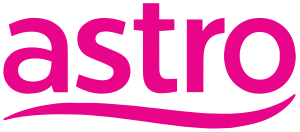Astro (company) facts for kids

The current logo, an third revision of the 2003 logo, in use since 2024.
|
|

Astro headquarters in Technology Park Malaysia
|
|
| Subsidiary | |
| Industry | |
| Founded | 1 June 1996 |
| Founder | Ananda Krishnan |
| Headquarters | All Asia Broadcast Centre (AABC), Technology Park Malaysia, Bukit Jalil, 57000 Kuala Lumpur, Malaysia |
|
Area served
|
Nationwide |
|
Key people
|
|
| Products | OTT Streaming Direct broadcast satellite Internet Service Provider |
| Revenue | |
|
Operating income
|
|
| Parent | Astro Malaysia Holdings Berhad |
Astro is a major Malaysian company that provides many services. It offers pay TV, which means you pay to watch channels, and also streaming TV. Astro is also an internet provider. The company is officially known as Measat Broadcast Network Systems Sdn. Bhd. It is part of a bigger company called Astro Malaysia Holdings Berhad.
Astro operates from its main center in Kuala Lumpur. It also has operations in Cyberjaya. Astro is one of the biggest media companies in Malaysia. In 2009, Astro launched Astro B.yond, which brought high-definition (HD) TV. In 2011, they introduced Astro IPTV for people who couldn't get satellite service. Later, in 2019, Astro launched Astro Ultra for super clear 4K TV. In 2021, Astro Ulti came out, offering full HD. Astro also used to operate in Indonesia (from 2006 to 2008) and Brunei (from 2000 to 2022). By 2016, about 71% of homes in Malaysia used Astro services.
Contents
History of Astro
How Astro Started
Astro received its license to operate in June 1994. The plan was to offer 20 TV channels through the Measat satellite. It was first set to launch in 1995 but started a year later. The company became known as All-Asia Satellite Television and Radio Operator, or ASTRO. It was managed by Measat Broadcasting Networks Systems. When it launched, Astro planned to offer 22 TV channels and 8 radio stations.
Before launching, Astro hoped to make a profit within three years. They aimed to have 700,000 subscribers. Astro officially launched on September 25, 1996. Soon after, they planned to offer internet speed to customers.
Astro made an agreement with Maybank. This allowed customers to pay their monthly bills easily. They could use phone banking or automatic payments through Visa and Mastercard. Astro also planned to open showrooms across the country. They wanted to reach 400 installations by January 1997. Astro also looked into broadcasting its services to other countries.
In April 1997, Astro partnered with MOCCIS Trading. This company helped market Astro's services to its members. Astro also planned to build its own private network. This would help them launch new interactive services. They spent RM25 million to improve their services for Malaysia and other countries.
Astro became the first client for Nortel in the ASEAN region. In July 1997, Astro signed a deal with Faber Group Berhad. Astro would provide satellite TV to seven of Faber's Sheraton hotels. From September to November 1997, Astro offered discounts on installation fees. They aimed to have 20,000 hotels using their pay-TV by the end of the year.
In December 1997, Astro worked with Oracle Corporation. Oracle helped Astro create a database for its business. Astro also spent RM100 million to lower the price of its Direct-to-U system for customers. In 1998, Astro planned to expand to the Philippines and Taiwan. This plan was later canceled.
Growing Astro's Services
Between 2000 and 2006, Astro shared broadcast time with TV Pendidikan. This was a Malaysian educational TV channel. It shared time with Animal Planet and later with TechTV. Many people felt that TV Pendidikan should stay on public TV. In 2007, TV Pendidikan moved to TV9.
By 2000, Astro had over 300,000 home subscribers. They aimed for one million subscribers in the next two years. Astro also partnered with Kristal Sdn. Bhd. from Brunei. Together, they launched Kristal-Astro in January 2000. This service stopped operating in 2022.
Astro invested over RM1 billion to build a digital broadcasting center. They also spent RM350 million to make their Digital Multimedia System affordable. Astro also planned to expand its services across Asia. By June 2001, Astro had 600,000 subscribers.
In April 2002, Astro signed a deal with Scripps Networks Interactive. This allowed Astro to show six TV series from HGTV in Malaysia and Brunei. In September 2002, Astro reduced some staff.
Astro partnered with Lippo Group from Indonesia in 2005. They launched a pay-TV service in Indonesia called Astro Nusantara in March 2006. Astro invested RM500 million in this operation. However, Astro Nusantara only lasted two years. It stopped in September 2008.
On October 1, 2007, Astro changed its channel numbers. They went from 2-digits to 3-digits to make room for more channels. In 2007, Astro had 29% of the TV audience in Malaysia.
In December 2009, Astro launched its high-definition service, Astro B.yond. This came with a new decoder and HD channels. Astro also partnered with TIME dotCom Berhad in December 2010. They worked together to offer broadband and IPTV services. In 2013, Astro signed a deal with Telekom Malaysia. This allowed two Astro SuperSport channels to be shown on HyppTV (now Unifi TV).
Recent Updates
On December 1, 2014, Astro partnered with GS Retail Co. Ltd. from South Korea. They launched a home shopping channel called Go Shop. This partnership lasted for 9 years. Go Shop stopped operating on October 12, 2023. This was due to changes in how people shop.
In March 2016, Astro launched Tribe, a video platform for Indonesia. In 2017, Astro worked with CJ E&M from South Korea. They created content and events for the ASEAN region. Astro also partnered with Karangkraf, a publishing company. They formed a company called Nu Ideaktiv to produce content.
Astro, Media Prima, and DiGi Telecommunications launched JomStudi in January 2019. This is a digital learning hub for students. It provides educational resources in one place. Astro also partnered with Chinese streaming platform IQIYI in 2019. Astro got the rights to distribute IQIYI's content in Malaysia. Astro also handled customer sign-ups, marketing, and sales for IQIYI.
On April 1, 2020, Astro changed its channel numbers again. They wanted to highlight their 100 HD channels. In 2021, Astro partnered with Netflix. This made Netflix available on Astro's platform.
In May 2024, Astro and Radio Televisyen Malaysia (RTM) launched Malaysia4Palestine. This was a special channel to show support for Palestine. It highlighted the humanitarian situation during the Gaza war. The channel broadcasted for one day on May 25, 2024. Many famous artists were involved in this project.
On October 17, 2024, Astro updated its sports channels. New names and channel numbers were introduced. Astro SuperSport channels were replaced with new Astro-branded sports channels. These include Astro Premier League, Astro Football, Astro Badminton, and Astro Sports Plus.
On November 18, 2024, Astro announced changes to Astro Warna and Astro Premier. These channels would no longer be linear TV channels. They merged with Astro Prima and Astro Citra. Astro Warna and Astro Premier became content hubs on Astro on Demand and Astro GO. However, some people were unhappy about Astro Warna's shutdown.
On December 2, 2024, Astro began leasing property in the Philippines. This was to expand its global reach. At the same time, Astro introduced Astro One. This is an entertainment package with three new options: Entertainment, Sports, and Epic.
Astro's Services and Products
Astro B.yond
Astro launched its high-definition (HD) platform, Astro B.yond, on December 11, 2009. It cost RM200 million to launch. It included a PVR (Personal Video Recorder) with a 500 GB hard disk. This allowed customers to record two live shows at once. They could also rewind and pause live TV.
Astro Go
Astro's streaming service started in 2012 as Astro On-The-Go (AOTG). This app let customers watch Astro TV channels, live events, and on-demand videos on their phones or tablets. The app was also made available for international users in March 2013.
The app was renamed Astro Go on March 31, 2017. It got a big update with new features. These included an easier-to-use design and better video quality. Astro Go also offers show suggestions based on what you watch. You can also download shows to watch offline.
Astro Fibre
Astro started offering broadband internet in 2011. They worked with TIME dotCom for their Astro B.yond IPTV service. To grow in the internet provider market, Astro partnered with Maxis in 2019. This led to the "Astro & Broadband" service. In 2022, Astro became an Internet Service Provider itself. They started offering standalone broadband through Astro Fibre. They also have BIZfibre services for businesses.
Astro NJOI
Astro NJOI is Malaysia's first free-to-view satellite TV service by Astro. It was launched with the Government of Malaysia on February 18, 2012. It started with 18 TV channels and 19 radio stations. Today, NJOI offers over 50 channels in Full HD. Most of these channels are part of the Family Pack.
Astro's Connected Boxes
In November 2019, Astro launched the Ultra Box. This was their first set-top box that customers could install themselves. It works with satellite or broadband internet. Key features include 4K UHD viewing and cloud-based recording. You can also access on-demand content.
Astro expanded its box options with the Ulti Box in 2021. It has similar features to the Ultra Box. The main difference is that the Ulti Box only provides HD resolution, not 4K UHD.
Awards and Recognitions
| Year | Award-giving body | Category | Recipient | Result | Ref. |
|---|---|---|---|---|---|
| 2009 | CASBAA Award 2009 | Chairman's Award | Astro | Won | |
| 2019 | MIRA Awards 2019 | Best Company for Investor Relations | Won | ||
| 2023 | Putra Brand Awards 2022 | Media Network Award | Platinum | ||
| Communications Network Award | Platinum | ||||
| e-Commerce Award | Platinum | ||||
| 2024 | Putra Brand Awards 2023 | Media Network Award | Platinum |
See also
 In Spanish: Astro (televisión) para niños
In Spanish: Astro (televisión) para niños
- Television in Malaysia
- Digital television in Malaysia
- Kristal-Astro
Other pay-TV service providers:
- Mega TV
- ABNXcess
- U Television (formerly known as MiTV)
- Unifi TV
- MYTV Broadcasting


